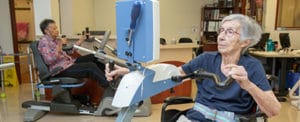
A Potentially Significant Study
Researchers at Northwestern Medicine and Northwestern University Feinberg School of Medicine recently reported highly successful results from the use of a wireless wearable device called a “myoelectric computer interface.” It measures the activity of individual muscles and employs a customized computer video game to encourage patients to move a cursor in specified directions to help encourage desired muscle activity. Reportedly, stroke patients with restricted arm mobility experienced beneficial results during a clinical trial of the device.
Although the new technology likely cannot assist all patients during rehabilitation, the initial results of the clinical trial reportedly pleased researchers. They have begun studying its effects on hospitalized stroke patients during the first week of rehabilitation. The wireless interface offers the advantage of furnishing immediate feedback when impacted muscles move correctly. Potentially, seniors recovering from strokes which cause a loss of mobility might in some cases wish to explore video gamification treatment options with a licensed physical therapist and their physicians.
The Promise of Therapeutic Video Gaming
Rehabilitative measures which enable patients to recover while playing computer games offer significant benefits. First, digital technology has become more widespread during recent years. Many people enjoy spending time playing games. Coupling this activity with medical monitoring and rehabilitation technology holds promise as a way to encourage patients to increase mobility and range of motion in some situations.
Second, the use of wireless interfaces potentially allows therapeutic video gaming to occur in residential settings. This development might ultimately help curb the high costs of care. The research team reported their findings in the March 19th edition of Neurorehabilitation and Neural Repair.
An Exciting Field
The current NIH-funded study used customized video games to assist patients. Perhaps in the near future, researchers will develop additional video gamification devices specifically to assist mobility impaired seniors? This rapidly expanding field may soon help nursing home and long and short term care residents around the world!
Helpful Resources:
- https://www.sciencedaily.com/releases/2019/03/190319163540.htm
- https://infosurhoy.com/cocoon/saii/xhtml/en_GB/health/video-recreation-remedy-helps-stroke-survivors-regain-arm-motion/
- https://en.wikipedia.org/wiki/Neurorehabilitation_and_Neural_Repair

